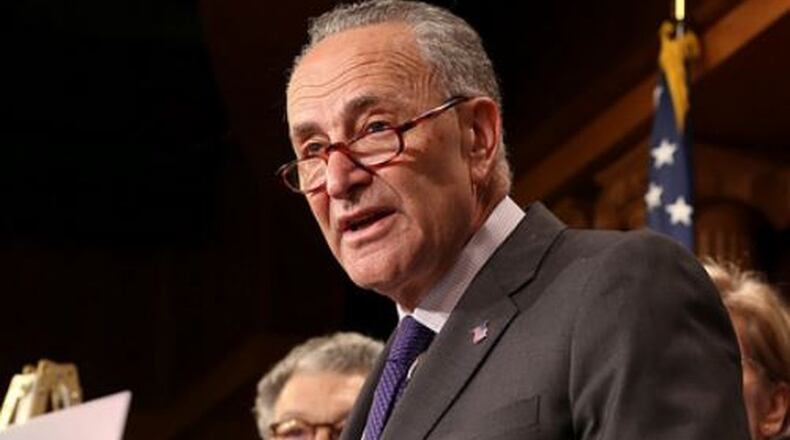PolitiFact last week looked at two claims by Democrat Charles Schumer, Senate minority leader, on the effects of Republican plans on taxes and Medicare; and at a National Rifle Association assertion that the Obama administration twice approved the sale of bump stocks for firearms, a device used by the Las Vegas mass killer. Here are summaries of our findings. Full versions can be found at www.politifact.com.
“The Republicans are proposing to pay for their giant tax cut to the rich by gutting Medicare and Medicaid.”
— Sen. Charles Schumer, D-N.Y., on Wednesday, Oct. 4, 2017 in a Senate floor speech
Schumer’s office calculated spending would top $8.5 trillion over the next 10 years, if no changes are made from the status quo. The GOP budget, by contrast, projects Medicare spending over the same period to be $8.1 trillion, for a difference of almost $473 billion.
The Senate Budget Committee did not quibble with Schumer’s Medicare number. However, it said this is not a “cut” since Medicare spending will still rise over the next 10 years — by about 82 percent instead of 99 percent. The committee said this slowdown is justified because the CBO says Medicare’s Hospital Insurance Trust Fund, which covers beneficiaries’ stays at hospitals and other facilities, will run out by 2025.
Medicare and Medicaid cuts aren’t as inevitable as Schumer suggests. The way things look now, the tax cuts would be easier to pass than the spending cuts.
Our ruling
The tax proposal includes significant tax cuts, and the Senate Republicans’ budget proposal reduces projected spending for Medicare and Medicaid by hundreds of billions of dollars over 10 years. However, Schumer has overstated a link between the proposals. His use of the word “gutting” implies that Medicare and Medicaid reductions are a drastic reshaping and are likelier to occur than they actually are.
We rate his statement Half True.
“The Obama administration approved the sale of bump fire stocks on at least two occasions.”
— National Rifle Association on Thursday, Oct. 5, 2017 in a press release
NRA spokeswoman Amy Hunter pointed us to a June 2010 approval letter from ATF to Slide Fire, a bump stock manufacturer. Spelling out the legal definition of a firearm, ATF’s technology chief John Spencer determined it was not regulated by law. We found a similar 2012 letter addressed to Bump Fire, a competing manufacturer.
But just as these bump stocks didn’t qualify for regulation, two similar devices did.
Experts in firearm policy were divided when we asked about the fairness of the NRA’s characterization.
A law professor at the University of California, Los Angeles, who specializes in guns said it was appropriate to characterize the ATF answer to the first two companies as an approval, “not because they liked it, but because the law did not permit them to prohibit it.”
Other legal experts stressed that it wasn’t an approval, but rather a determination that current law didn’t allow for that device’s regulation.
Our ruling
On two occasions during the Obama administration ATF, a bureau in the executive branch, decided it could not regulate bump stocks. These decisions allowed two companies to sell bump stocks. This was not a statement of Obama’s preferred policy, which called for more regulation of guns, but was what the agency determined it had to do under the language of current law.
We rate this statement Mostly True.
Trump’s tax plan is “completely focused on the wealthy and the powerful — not the middle class.”
— Sen. Charles Schumer, D-N.Y., on Sunday, Oct. 1, 2017 in an interview on CBS’ “Face the Nation”
Trump’s tax plan would increase the lowest tax rate and increase the number of people who don’t have to pay federal income tax.
More people in the lowest tax bracket would not have to pay federal income tax under Trump’s plan.
Many of the tax changes would benefit high-income earners more than others, a report from the Tax Policy Center said.
Some of the proposals, like ending the alternative minimum tax and estate tax, would benefit high-income earners disproportionately.
Our ruling
There are lots of details missing from Trump’s tax plan. But the plan presented so far does deal with taxpayers who are not wealthy. It’s possible that by “completely focused,” Schumer meant the Trump plan benefits only the wealthy and the powerful. That also is not completely true. Doubling the standard deduction as Trump proposes would mean more of the country’s lowest earners would pay no federal income tax and taxpayers earning less than about $150,000 would see a tax cut.
We rate Schumer's statement False.
About the Author
Keep Reading
The Latest
Featured


